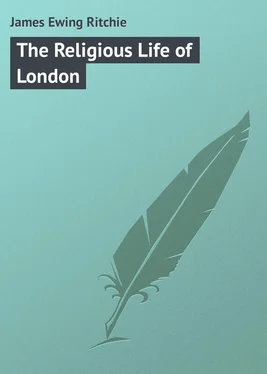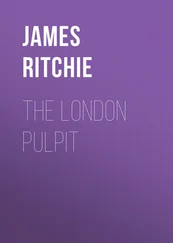James Ritchie - The Religious Life of London
Здесь есть возможность читать онлайн «James Ritchie - The Religious Life of London» — ознакомительный отрывок электронной книги совершенно бесплатно, а после прочтения отрывка купить полную версию. В некоторых случаях можно слушать аудио, скачать через торрент в формате fb2 и присутствует краткое содержание. Жанр: foreign_prose, на английском языке. Описание произведения, (предисловие) а так же отзывы посетителей доступны на портале библиотеки ЛибКат.
- Название:The Religious Life of London
- Автор:
- Жанр:
- Год:неизвестен
- ISBN:нет данных
- Рейтинг книги:3 / 5. Голосов: 1
-
Избранное:Добавить в избранное
- Отзывы:
-
Ваша оценка:
- 60
- 1
- 2
- 3
- 4
- 5
The Religious Life of London: краткое содержание, описание и аннотация
Предлагаем к чтению аннотацию, описание, краткое содержание или предисловие (зависит от того, что написал сам автор книги «The Religious Life of London»). Если вы не нашли необходимую информацию о книге — напишите в комментариях, мы постараемся отыскать её.
The Religious Life of London — читать онлайн ознакомительный отрывок
Ниже представлен текст книги, разбитый по страницам. Система сохранения места последней прочитанной страницы, позволяет с удобством читать онлайн бесплатно книгу «The Religious Life of London», без необходимости каждый раз заново искать на чём Вы остановились. Поставьте закладку, и сможете в любой момент перейти на страницу, на которой закончили чтение.
Интервал:
Закладка:
Again, let us take another illustration of High Church literature: “Innovations: a lecture delivered in the Assembly Rooms, Liverpool, by Richard Frederick Littledale, Priest of the Church of England.” The aim of Dr. Littledale is to show that prayers for the dead, the choral service, the sign of the cross, the weekly offertory, the daily celebration of Holy Communion, the elevation of the Host, turning to the east, the division of the sexes in churches, the mixed chalice, incense, vestments, and lights are not innovations. He knows so little of history that he tells us that the conversion of our forefathers is due to Gregory the Great (the man under whom Popery was introduced into England); calls Edward VI. “ a tiger cub ,” and speaks of Cranmer, the martyr for his religion, as having “ been arrested in his wicked career by Divine vengeance .” He says, “of the depth of infamy into which this man descended” he has not leisure to speak; and all the Reformers, according to him, were equally bad. Dr. Littledale says, “Documents, hidden from the public eye for centuries, in the archives of London, Venice, and Simancas, are now rapidly being printed, and every fresh find establishes more clearly the utter scoundrelism of the Reformers .”
The Doctor admits the Church of England was in need of a physician in Henry VIII.’s time. His language is, “A Church which could produce in its highest lay and clerical ranks such a set of miscreants as the leading English and Scottish Reformers must have been in a perfectly rotten state – as rotten as France was when the righteous judgment of the Great Revolution fell upon it.” The Rev. Thomas W. Mossman, West Torrington Vicarage, Wragley, Yorkshire, goes further still. In a letter to Dr. Newman, he says he believes that a time will come to pass that Anglicans will also see that it is God’s will that they should submit to the Holy Apostolic See, and that it is their duty as well as their privilege to be in communion with that Bishop who alone is the true successor to St. Peter, and by Divine Providence the Primate of the Catholic Church. He speaks of the “lurid murky flame of Protestantism enkindled in the sixteenth century;” and hail the light “once more beginning to beam upon us from the Eternal City, where the Prince of the Apostles and the Doctor of the Gentiles shed their blood.” When such are the utterances of leading clergymen, – if the Church of England were Church of the nation as it claims to be, the language of Dr. Manning would be undeniably true. “Protestantism is dead in England. We may save the time which controversy wastes, and instead of going out into the battle-field, we may go into the harvest-field to reap and to bind and to gather our sheaves into our garner.”
Dissent, however, has not been taken into account. It is rarely a Dissenter becomes a Roman Catholic. It is impossible, if he understands his principles, that he should. To too many it is the Church of England that leads to that of Rome.
CHAPTER VI.
the church of england
The peculiarity of the Church of England, that by which it is distinguished from orthodox Dissent, is the priestly character of its claims, and its intolerance of other sects.
The “Tracts for the Times” tell us “that the Bishop is Christ’s representative, and the priests the Bishop’s, so that despising the clergy is despising Christ.” “A person not commissioned may pretend to give the Lord’s Supper, but it can afford no comfort to any one to receive it at his hands; and as for the person who takes it on himself without a warrant to minister in holy things, he is all the while treading in the steps of Korah, Dathan, and Abiram. It is only having received this commission that can give any security that the ministration of the Word and the Sacraments shall be effectual to the saving of your souls. The Dissenters have it not.”
The Dean of Chichester writes – “Our ordinations descend in a direct unbroken line from Peter and Paul. Unless Christ be spiritually present with the ministers of religion in their services, those services must be vain. But the only ministration to which He has promised his presence are those of the Bishops, who are successors of the first commissioned Apostles, and the other clergy acting under their sanction and authority.”
The Bishop of Winchester says – “We believe that we do possess, as we cannot see that others do, Christ’s direct commission for our ministry, and a certainty and fulness, therefore, of His presence and of His Sacramental working, which, to say the least, may be lacking elsewhere. If we do not hold as much as this we must dissent from the plain language of our own Ordination Service.” The Bishop also denies that it is a superstitious theory that “the clergy can convey to the soul by a material intervention some spiritual influence in an occult manner.”
The Rev. E. Blenkinson, in the “Church and the World,” a book presented to Convocation by the Bishop of Oxford, says the Protestant bodies have “cut themselves off from the participation of the one Spirit as living in the Church and flowing through the Sacraments, which are the veins and arteries of the body.” The last utterance on the subject is that of the Bishop of Ely, who places the first and undisputed General Councils as of equal authority with Scripture. The Catechism teaches Baptismal Regeneration. The clergy also tell us that they are called by the Holy Ghost, that the Bishop has conferred on them spiritual graces by the laying on of hands. This is the theory of the Church of England. In accordance with this in time past, it drove out the Evangelicals on Bartholomew Day, and has at any rate till our time prosecuted Broad Churchmen for heresy.
The bitterest opponents of this theory are the Evangelicals. It is a singular and noteworthy fact, that the theology dearest to the hearts of the people is that which teaches in the plainest manner the literal inspiration of the Bible, the doctrine of Original Sin, of Predestination, of everlasting damnation, of a Devil ever thwarting the designs of a benevolent Deity, and seeking whom he may devour. Yet the character given by Dr. Arnold of the Evangelical clergy is still true, and accounts for the little influence they have in educated circles. Another fact also becomes increasingly prominent: their readiness to swallow their words, to quietly accept whatever may be offered them by their opponents apparently merely for the sake of position in society. Every now and then a crisis occurs in the history of the Church. If Baptismal Regeneration, for instance, be ruled to be permissible they must leave, and then when the time comes for them to arise and become martyrs, they quietly pocket their principles and remain. Of course they plead their greater opportunities of usefulness, as if religion were better served by dishonesty than by honesty, – as if the cause of God were better advanced by falsehood than by truth, – as if position as regards society were of more importance than the man’s consciousness of independence and honourable life. For the ritualist or the Broad Churchman it is no difficult matter to remain in the church in company with the Evangelical; but they, in accordance with his theory, are teaching soul-destroying errors; yet he remains with them, and is, according to his idea, a partaker in their sins.
The characteristic of our day is the Broad Churchmanship, which rejects the common theology as a prejudice well fitted for certain times, but unworthy of credence now. Of this party are the ablest men in the Church; all who are disgusted with the childishness of ritualism – with the narrowness of orthodox formulas, turn to them, and hail them as the regenerators of Church and State. Such men as Dean Stanley and Mr. Maurice are a power in the land. They walk hand in hand with the poets and men of science of our time. In their teaching is gathered together much that is best and truest in the wisdom of the past. The difficulty of their position is that they are tied down as strongly as they can be to orthodoxy, and half their strength is wasted in the effort to show they have a right to be where they are. Nevertheless it is quite true that there can be no honest faith without honest doubt; that we fight our fears and gather strength; that as we know more, we feel how outworn is the old creed of Christendom. Sir J. D. Coleridge tells us the Articles are Articles of peace – that is, for the sake of uniformity a minister may make statements which he cannot believe. But a man who cannot trifle with words is denied all this liberty; he is tied hand and foot. The State gives him moral prestige, supremacy, wealth, on certain conditions. The Dissenter is free; the wildest ranter has a liberty which an Archbishop may sigh for in vain. Such is the law. A State Church such as is desired by Broad Churchmen is an impossibility. And yet in spite of the rival and differing parties in the Church, and in spite of the fact that Churchmen themselves are longing to be free of the fetters of the State, I know not that the Church of England, as regards London, was ever stronger than now. The layman has little sympathy with Church squabbles: he goes to church feeling that in doing so he is not committed to any form of belief or worship. Dissent requires some sort of faith as preliminary to fellowship. In the Church you avoid all this: the Puseyism of the pulpit seldom extends to the pew. Then, again, there is a natural yearning in all minds after national union in religious as well as political matters. The higher class of Dissenters display this feeling in an extraordinary degree. Their chapels are built like churches – they cling to the steeple which the stern old Puritans considered an abomination – the meeting-house has ceased to exist. Day by day Dissent gets rid of all its characteristics – its ministers assume a clerical appearance – they adopt the Prayer-book as their model – they now listen to read sermons and read prayers. Of late years their leaders have grown rich and respectable, and anxiously disclaim all connexion with the loud and exciting form of worship that has attractions for the ignorant. You may safely assume that the teaching of modern Dissent is indirectly in favour of the Establishment. Dissenters tell us they have modified their customs in order to retain their hold upon the young of the wealthy classes. But they cannot be retained by means like these. It has almost become a proverb, that in the third generation they will pass through the chapel to the church. Half the great mercantile houses of London and the empire were founded by Dissenters whose sons, as they have grown rich and cultivated, feel more and more the awkward isolation of Dissent. Increasingly this feeling is spreading among Dissenters, and the Church, if it were wise – its history is a career of blunder upon blunder – would have laid its plans to recover such. All the levers of society have been at its disposal. The Establishment rolls in wealth; there is no other Church in the world so wealthy; the aristocracy are bound to support it. Literally, there is in our land no career for a Dissenter. Dissent is a stigma in society. Even men who have no religious predilections would scorn the name of Dissenter. The schools, the universities – all have wealth and honour for those who will conform; and for those who conscientiously refuse to do so – exclusion and disgrace.
Читать дальшеИнтервал:
Закладка:
Похожие книги на «The Religious Life of London»
Представляем Вашему вниманию похожие книги на «The Religious Life of London» списком для выбора. Мы отобрали схожую по названию и смыслу литературу в надежде предоставить читателям больше вариантов отыскать новые, интересные, ещё непрочитанные произведения.
Обсуждение, отзывы о книге «The Religious Life of London» и просто собственные мнения читателей. Оставьте ваши комментарии, напишите, что Вы думаете о произведении, его смысле или главных героях. Укажите что конкретно понравилось, а что нет, и почему Вы так считаете.












